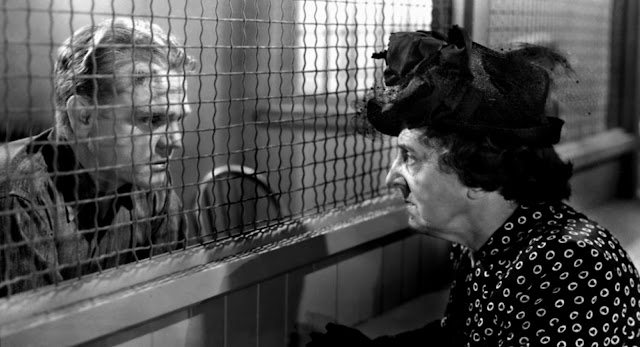Classic Film of the Week #4: White Heat (1949)
It was only a matter of time before James Cagney, possibly my very favorite classic Hollywood actor, made an appearance in this series. Despite being such a big fan of him, I still haven't seen many of his most acclaimed films, and today I look at what was up to now my most glaring blindspot: his 1949 comeback gangster film, White Heat.
Directed by Raoul Walsh and starring James Cagney, Virginia Mayo, Edmond O'Brien, and Margaret Wycherly, White Heat is a rather unique entry in both Cagney's filmography and in the crime and noir genres as a whole. The story follows Cody Jarrett (James Cagney) and his Ma (Margaret Wycherly), a mama's boy and a mother who is only too happy to indulge her son's fixation, respectively. However, this strangely close relationship doesn't keep the pair from being some of the roughest, toughest criminals around: Cody is a homicidal maniac and his Ma will go to any lengths to protect her boy, even from the law. Further complicating the situation is Cody's frail mental health, with Ma Jarrett as the only person who can calm him during his fits. When things get too hot for Cody after a train robbery, he confesses to a crime he didn't commit, one that promises a much shorter sentence and also gives him an alibi that means he can't be pinned with the killings on the train. Little does he know that an undercover cop, Vic (Edmond O'Brien), is going in with him, with the goal of getting Cody to trust him and thereby confess to his real crimes. In his determination to get Cody to talk, Vic even agrees to help him bust out, in a seemingly foolproof plan of escape and then capture by a tipped off police force. However, no plan is foolproof, and Vic's crashes straight into Cody's unforgiving and unrelenting criminal nature, resulting in a maze of death, deceit, and coincidence that promises no one is getting out of this thing unscathed.
Cody and Ma Jarrett are perhaps the most unique duo in the history of noir, a genre where tough, stylized characters are the norm--as entertaining, charming, or even terrifying as they may be, they never feel like real people, always uniquely cinematic interpretations of human nature. This is not the case for Cody and Ma: in their first scene alone together, where we learn about Cody's "headaches" and Ma's role in soothing them, we are witness to a portrait of a very pure, deep love between mother and son that feels authentic in a way relationships in noir rarely do. Out of context from the rest of the film, this scene doesn't suggest noir or crime at all; perhaps a 1940s melodrama about the ups and downs in the mother and son's lives over the years. There's a particularly great shot in which Cagney sits on Wycherly's lap and the two embrace, in a way that is reminiscent of a mother and her little boy, rather than an elderly woman and a grown man. And yet, their emotions are so palpable that you don't question it for a moment. However, what truly sets this pair apart is the fact that you never question Cody as a homicidal criminal: James Cagney pulls off the seemingly impossible feat of portraying Cody as both a mama's boy and an incredibly tough, violent outlaw, with neither side to his personality ever ringing false. In fact, much of his strength is clearly drawn from his close relationship with Ma, who is no weak old lady stereotype herself: where a modern film would probably play her hard-boiled toughness for laughs, this film takes her deadly serious and as a result, so does the audience.
Interestingly, less than halfway through the film Cody Jarrett is replaced as lead character with Vic, who plays the staple noir detective who is willing to get his hands dirty to get his man, but not-so-secretly always has his heart in the right place. However, Vic is really just that: a staple, who can never take our attention away from the utterly unique and charismatic Cody. It's very interesting how the film manages to make us sympathize with this murderous, borderline insane criminal; even though Vic is the "hero" of the story and Cody the "villain", it's very difficult to root for the former over the latter. I mean, just look at that face: even when Cagney busts out that signature angry, growling expression, as he does many times in this film, it's impossible not to be charmed by him. He's truly one of Hollywood's great actors, a man who always knew how to keep his audience wrapped around his little finger no matter what kind of character he played.
While White Heat differs from other noirs in terms of its central characters, it certainly does not in terms of its plot, filled with all of the twists and turns that are a staple of the genre. It even has a conniving femme fatale, Vera, played wonderfully by Virginia Mayo. I enjoyed that rather than being the stereotypical gangster's moll, she was actually married to Cody, leading to a really great--and tense--mother-in-law/daughter-in-law dynamic between her and Ma. I liked that Vera's ultimate betrayal of Cody is never actually discovered by him; something else unique about the film is how it always gives us new information before revealing it to the characters, keeping us one step ahead for the whole run-time--it really increases the tension as we wait for the ball to drop.
The greatest films of any genre ironically tend to be the ones that break away from what we expect, stretching our understanding of what their respective genre is capable of and thereby paving the way for a new kind of film within their pre-existing category. White Heat is a perfect example, serving as one of the greatest examples of film noir while infusing its story with a pair of characters quite unlike anything seen in noir before. Cody and Ma Jarrett are a cinematic pairing for the ages, and one not to be missed: White Heat comes highly recommended as an essential for any classic film fan, and is available on DVD, Blu-Ray, and as a showing on TCM.






Comments
Post a Comment